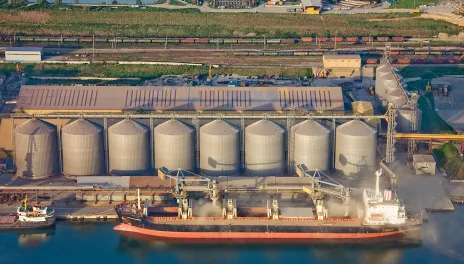NDSU Research Examines the Global Grain and Oilseed Market Implications of the Russia-Ukraine War
The Russian invasion of Ukraine has created immense human suffering and damaged global trade, says an NDSU economist. The World Trade Organization estimated that the global economic prospect has “darkened” considerably since the war started on February 24, 2022. Global trade growth has fallen from 4.7% to between 2.5% and 3.4%, with the adverse trade effects being concentrated in Europe and Africa.
Ukraine and Russia are major agricultural commodity exporters that ship most of their grain and oilseed harvest via Black Sea ports. Prior to the Black Sea Grain Initiative, the war limited this mode of transport considerably for Ukraine in particular, causing repercussions for farmers all around the globe and inducing a global reallocation of trade flows for some agricultural commodities.
Sandro Steinbach, associate professor in the NDSU Department of Agribusiness and Applied Economics, director for The Center for Agricultural Policy and Trade Studies, and Challey Institute Scholar, is working with researchers from the University of Connecticut to understand the implications of the Russian invasion of Ukraine for agricultural trade.
“The goal of our research was to quantify the direct and indirect impact of the war on global grain and oilseed markets and to assess the global reallocation trade dynamics for these crops,” says Steinbach.
To complete the study, the researchers examined commodity-level import data from 85 reporting countries and 197 partner countries from August 2015 to July 2022.
The research found that:
- Between February and July 2022, grain imports from Ukraine were 12.9 million tons below their previous historical level. At the same time, Russia experienced limited trade diversion, increasing its overall grain and oilseed exports by 0.4 million tons.
- Export losses for Ukraine concentrated on grains, with minor quantity effects for milled grains, oilseeds and vegetable oils.
- The war benefited grain and oilseed exporters in Europe and North America, which increased their grain export by 10.5% and 22.1%, respectively.
- The Black Sea Grain Initiative eased some quantity constraints and price pressure after July 2022 by pushing an additional 31 million tons of grains and oilseeds out of Ukraine.
“Before the Russian invasion of Ukraine, a significant share of Ukraine’s grain and oilseed exports were shipped to vulnerable net-food-importing countries,” explains Steinbach. “Our analysis shows that grains produced in Ukraine were replaced by exports of similar varieties from other regions not impacted by the war disruptions, implying that the Black Sea Grain Initiative could have benefited some developed countries more than vulnerable developing countries. Our analysis indicates that the Russia-Ukraine war had substantial trade implications for the directly involved countries, but only limited ones for the global grain and oilseed markets.”
North Dakota Implications
“This research is important to North Dakota because it helps us to better understand, predict and react to global price adjustments as a result of the war,” says Frayne Olson, NDSU Extension crops economist and marketing specialist.
“Wheat farmers in North Dakota don’t compete head-to-head with Ukraine and Russia to sell wheat on the global market,” explains Olson. “But countries that typically bought Ukrainian and Russian wheat had to shift their buying to other countries, thus affecting and redistributing global supply.”
“Dr. Steinbach’s research shows that the turmoil and uncertainty of the war, caused global grain prices to increase approximately $1.86 per bushel, which translated into higher prices for North Dakota wheat and corn farmers,” says Olson. “North Dakota farmers should expect the continuing war to influence global prices and prices at the local elevator, and should be ready to make marketing decisions quickly as prices change.”
This research was funded by the U.S. Department of Agriculture (USDA) – Foreign Agricultural Service. Along with researchers from the University of Tennessee-Knoxville and Louisiana State University, Steinbach was recently awarded an $800,000 grant from the USDA – National Institute of Food and Agriculture to examine how global agricultural supply chains adjusted to the Russia-Ukraine war.
FOR MORE INFORMATION:
Sandro Steinbach, 701-231-7459, sandro.steinbach@ndsu.edu
Frayne Olson, 701-231-7377, frayne.olson@ndsu.edu
